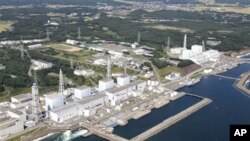The head of the U.N.'s nuclear monitoring agency said Thursday that global use of nuclear power will continue to grow, despite the shock waves sent through the industry after a massive earthquake and tsunami caused an accident at a Japanese nuclear power plant earlier this year. At the United Nations, there was a special high-level meeting on the safety and security of the world's nuclear power plants.
International Atomic Energy Agency (IAEA) Director-General Yukio Amano told the nuclear summit that in the six months since Japan's Fukushima Daiichi nuclear power plant was crippled, his agency has been working closely with Japan to contain the damage.
"The agency's assessment now is that the reactors are essentially stable and the expectation is that the 'cold shutdown' of all the reactors will be achieved as planned," said Amano.
Speaking via a video message from IAEA headquarters in Vienna, Amano said worldwide public confidence in the safety of nuclear power was deeply shaken by the radiation leak after a March 11 earthquake triggered a massive tsunami. Some 80,000 people had to be evacuated from the area near the crippled Japanese plant.
But the IAEA chief said the accident does not mean the end of nuclear power.
"In fact, the latest IAEA projections show that global use of nuclear power will continue to grow quite significantly in the coming decades, although at a slower pace than in our previous projections," added Amano. "The growth will reflect unchanged factors such as increasing demand for energy as well as concerns about climate change, dwindling reserves of oil and gas, and uncertainty of supply of fossil fuels."
Amano said the IAEA Board of Governors has approved an action plan on nuclear safety that includes measures for states to review the preparedness of their nuclear power plants to withstand natural disasters. International experts will also be assembled to assess the safety of a country's nuclear reactors, its emergency preparedness and response capabilities, and the effectiveness of its nuclear regulatory system.
Japanese Prime Minister Yoshihiko Noda told the meeting that it is clear that the government was underprepared for a tsunami.
"It is clear that electrical power supplies for emergency use and pumps should not have been situated in locations that could be submerged by tsunamis," said Noda. "Insufficient were preparations for a severe accident that would result in damage to the reactor core."
But Noda added the most recent estimates indicate that the amount of radioactive material being released from the Fukushima Daiichi plant is one-four millionth of the level during the early stage of the accident.
U.S. Secretary of State Hillary Clinton also addressed the nuclear meeting. She said the Obama administration recognizes that nuclear power is a vital contributor to the world's energy needs and that it is not an option that can be taken off the table.
"But it is an option that carries special risks and dangers," Clinton said. "Therefore, we must do everything possible to ensure its safe and responsible use. We must remain vigilant against outside threats and internal weaknesses to prevent accidents from occurring. We must make continuous improvements to regulations and strengthen implementation of existing conventions so we hold ourselves, and others, to the highest standards."
Clinton said exhaustive international response plans must be enacted so that if an accident occurs, the damage is contained as much as, and as soon as, possible.
IAEA Chief: Use of Nuclear Power Growing Despite Japanese Accident




